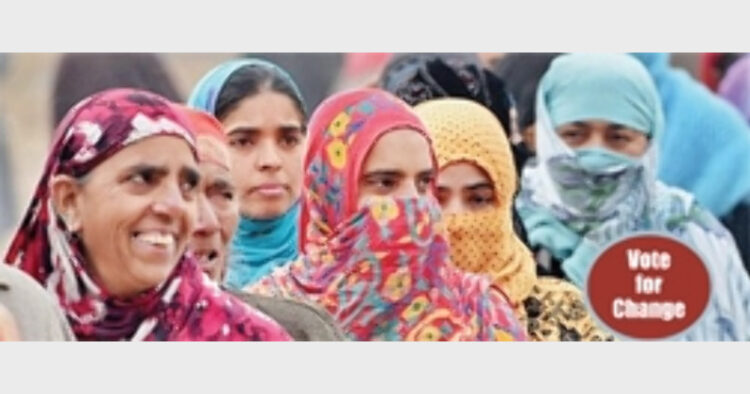Intro: In Jammu-Kashmir Assembly elections, it’s the electioneering of development, inclusion and acceptance of regional plurality that has tendered all the efforts by separatists ineffective.
Voting for fifteen constituencies of Jammu-Kashmir was underway when an explosive, planted and sponsored by Pakistan, exploded near a voting booth in Bandipora of Kashmir Valley. Voters did not fear this time, neither the queues broke nor the length decreased and the people of Kashmir did not deter from their determination to participate in the election process. At the end of the day Bandipora voted 70 percent, disquieting the enemies of democracy; the separatists and the Pakistan.
In the first phase, J&K voted to new records with turnout of 71.83 percent, which is even higher than the percentage of voter turnout during Panchayat elections in J&K. Salutes to brave electors of Kashmir Valley; most of them young, for braving the brunt of Jihadi elements by marching towards booths, despite chill and intimidation. Which party wins the election will be decided on December 23, but who wins and who will lose weighs less compared to the awakening of democratic spirit in the Valley: The participation of the Valley people in ongoing Assembly elections assures India that they want to re-write their destiny.
The reason for this change lies in the change in the nature of the competition among the parties that has emerged this time. Previously, the politics of J&K revolved heavily around regional aspirations and identity. In fact, parties like NC and PDP openly used the issue of Kashmiri supremacy over other two regions; Jammu and Ladakh. In projecting themselves as pro-Kashmir parties, they not only focused on the issues that their leadership felt would attract the voters in Kashmir, but they also sought to play the regional sentiment to its maximum. Even the issue like women’s right to be the permanent residents of the state; or, the issue of transfer of land to SASB were taken by these parties assuming these were associated with some kind of regional aspirations. Most of the time, these parties spoke the language of separatists.
As a change, this time all main parties are fighting the elections alone and every party wants to grab maximum possible seats in the assembly. Where Congress has declared itself as the party of Jammu region, BJP is not only trying to get as many seats from Jammu and Ladakh regions, but is also vying for seats from Kashmir. The party has already proven its inclusiveness to Kashimiris by fielding more than 40 percent Muslim as its candidates. All the candidates of BJP were Muslims in the first phase of election in Kashmir Valley.
Prime Minister Narendra Modi’s efforts to reach out to Kashmiri people have made competition tough for Valley Centric parties like NC and PDP. For this election, the parties have been forced to spread their reach outside the Valley by abandoning their regional turfs and bringing an end to the region-based politics.
At the end of first phase of Assembly elections in J&K, it’s the electioneering of development, inclusion and acceptance of regional plurality that has tendered all the efforts by separatists ineffective. Also important to remember is the role of Indian Army, which foiled many desperate efforts of infiltration by Pakistani’s in Jammu and Kashmir.
This election thus will be marked as one such unique election in the history of Jammu and Kashmir, when for the first time, emotive issues based on identity politics are not being raised. Arvind Kumar














Comments